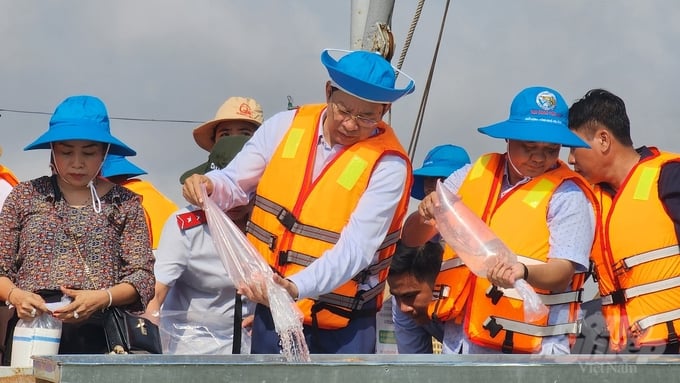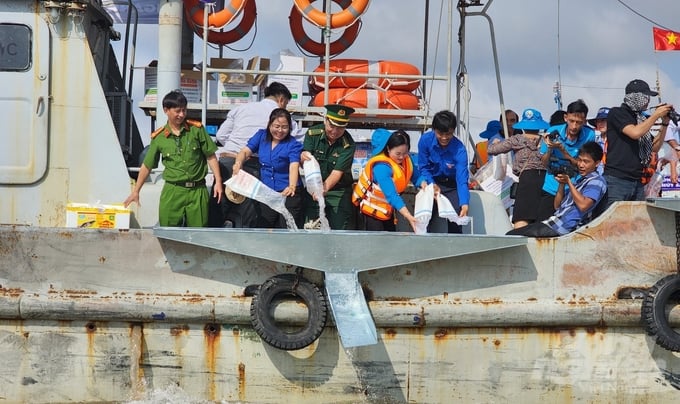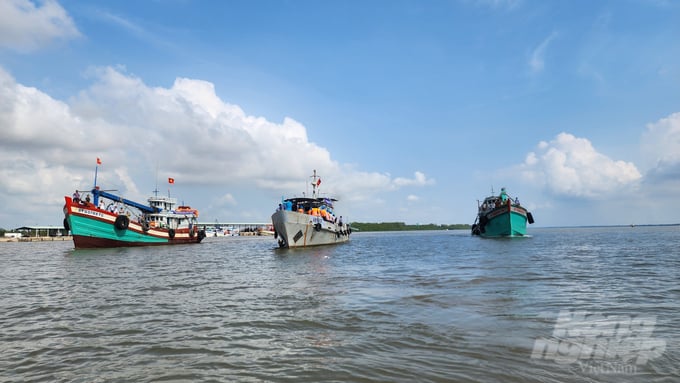November 20, 2025 | 15:31 GMT +7
November 20, 2025 | 15:31 GMT +7
Hotline: 0913.378.918
November 20, 2025 | 15:31 GMT +7
Hotline: 0913.378.918

The leaders of Soc Trang province, in collaboration with various departments, committees, sectors, and youth union members, participated in the releasing of seeds for the regeneration of fisheries resources. Photo: Kim Anh.
Soc Trang province's Department of Agriculture and Rural Development , in collaboration with the Tran De district People's Committee, organized the release of over two million shrimp seeds into the natural environment, with an approximate value of 300 million Vietnamese dong sourced from the provincial budget and philanthropists.
Mr. Vuong Quoc Nam, Vice Chairman of the Soc Trang Provincial People's Committee, acknowledged that the province's fisheries sector has faced numerous challenges in recent years due to the impacts of climate change and irresponsible exploitation activities. Consequently, these activities have endangered the habitats of aquatic species, resulting in a significant decline in fisheries resources.
Notably, Vietnam is currently under the restriction of the "yellow card" issued by the European Commission. Accordingly, the warning has greatly affected exploitation and export activities nationwide and within Soc Trang province to a lesser extent. As a result, the release of seeds to supplement and develop natural fisheries resources is an urgent response, requiring concerted efforts from all levels of the government, sectors, and the entire community to implement.

Over two million shrimp seeds have been released into the natural environment. Photo: Kim Anh.
The supplementary seed release activity not only contributes to the restoration and regeneration of fisheries resources under natural conditions, but also provides livelihoods for fishermen in maintaining ecosystem balance. Furthermore, the activity aims to orient fishermen's exploitation activities towards responsible practices, thereby rejuvenating natural fisheries resources.
The Vice Chairman of the Soc Trang Provincial People's Committee suggested all levels of the government, departments, committees, agencies, and social organizations to develop detailed, regular, and continuous action plans. This includes strengthening information dissemination efforts and mobilizing the community to participate in protecting and developing fisheries resources.
According to the plan, Soc Trang province will organize three rounds of seed release into the natural environment in 2024. So far, over two million shrimp seeds and 300 kilograms of various fish seeds have been released into the natural environment, contributing to the restoration of fisheries resources in the province.

A fleet of three vessels heading for the Tran De coastal area to release seeds into the natural environment. Photo: Kim Anh.
Ms. Quach Thi Thanh Binh, General Director of the province's Sub-Department of Fisheries, stated that the annual seed release activity for the regeneration of fisheries resources receives support from local leaders, businesses, departments, and stakeholders within the industry.
Soc Trang province releases an average of four million seeds into the natural environment every year, with a focus on shrimp, crab, freshwater fish, and several economically valuable fish species.
Mr. Co Minh Phuong, Chairman of the Fisheries Association in Tran De fishing village, Tran De district, emphasized that this practical and meaningful activity is the most effective solution in raising awareness. Fishermen can harvest, protect, and restore fisheries resources simultaneously.
Translated by Nguyen Hai Long

(VAN) This is the study conducted by IRRI and Can Tho University on the rice straw value chain in Mekong Delta showing an economic potential of more than 6.6 trillion VND/year.

(VAN) By participating in cooperative economics, many farmers in Tay Ninh have overcome hardship, mastered clean dragon fruit cultivation techniques.

(VAN) The crossbreeding program in the former Binh Dinh province (now part of Gia Lai) has shown signs of decline, and urgent measures are needed to revive it and sustain past achievements.

(VAN) The agricultural sector agreed on a roadmap to pilot the MRV protocol and expand low-emission rice production from the 2025-2026 winter-spring crop.

(VAN) Agricultural extension officers in Quang Ninh do more than transmit knowledge; they have become a steadfast support system for farmers on the path to sustainable agricultural development.

(VAN) The development of a high-quality beef cattle herd has brought major benefits to livestock farmers, creating jobs and enabling better use of agricultural by-products.

(VAN) In the eastern region of Gia Lai, crossbred cattle now account for 93%, forming a high-quality beef herd and establishing a recognized brand, the result of 35 years of persistent effort.